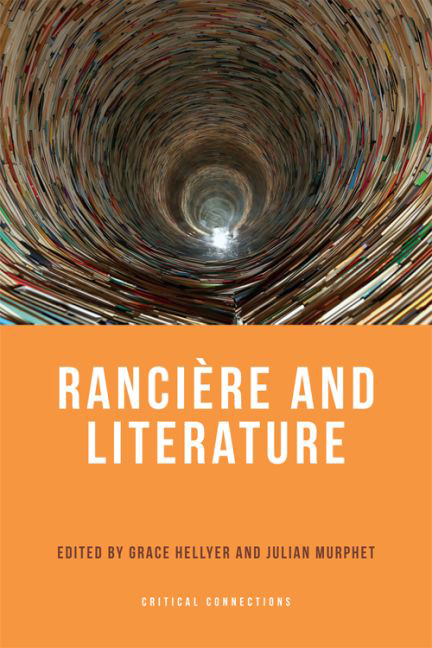Book contents
- Frontmatter
- Contents
- Acknowledgements
- Notes on Contributors
- Introduction: Rancière and Literature
- SECTION I Coordinates
- SECTION II Realisms
- SECTION III Contemporaneities
- 10 Ineluctable Modality of the Sensible: Poverty and Form in Ulysses
- 11 The Politics of Realism in Rancière and Houellebecq
- 12 Literature, Politics and Action
- Index
10 - Ineluctable Modality of the Sensible: Poverty and Form in Ulysses
from SECTION III - Contemporaneities
Published online by Cambridge University Press: 15 September 2017
- Frontmatter
- Contents
- Acknowledgements
- Notes on Contributors
- Introduction: Rancière and Literature
- SECTION I Coordinates
- SECTION II Realisms
- SECTION III Contemporaneities
- 10 Ineluctable Modality of the Sensible: Poverty and Form in Ulysses
- 11 The Politics of Realism in Rancière and Houellebecq
- 12 Literature, Politics and Action
- Index
Summary
‘His true Penelope was Flaubert’
Gustave Flaubert, Jacques Rancière's exemplary hero of the aesthetic regime, is also – despite Rancière's ongoing effort to use that example to dismantle the very thesis of literary modernity – one of the totemic figures in the critical establishment of modernism. Ezra Pound famously put it that modern poets have more to learn from the prose of Flaubert than from any other writer: ‘I believe no man can now write really good verse unless he knows Stendhal and Flaubert. […] To put it more strongly, he will learn more about the art of charging words from Flaubert from all the floribund sixteenth-century dramatists.’ Pound made telling claims for the art of James Joyce in similar terms: ‘English prose catches up with Flaubert,’ he said of Joyce's Dubliners (1914); and still more significantly he hailed Ulysses (1922) as ‘the first [book] which, inheriting from Flaubert, continues the development of Flaubertian art from the point where he left it in his last unfinished book’, Bouvard et Pécuchet. Still further, Pound averred that ‘Joyce has taken up the art of writing where Flaubert left it […]; he has brought it to a degree of greater efficiency, of greater compactness; he has swallowed the Tentation de St Antoine whole, it serves as comparison for a single episode in Ulysses. Ulysses has more form than any novel of Flaubert's.’ This double insistence, on the superiority of form in Ulysses relative to Flaubert's work, and on its consummate extension of the last, unfinished Flaubertian experiment in Bouvard et Pécuchet, certainly requires some comment, since it flies in the face of a certain persistent orthodoxy regarding Joyce's masterpiece: that its central claim to critical recognition rests upon what Eliot identified as its discovery of the ‘mythic method’ – ‘manipulating a continuous parallelism between contemporaneity and antiquity […] a way of controlling, of ordering, of giving a shape and a significance to the immense panorama of futility and anarchy which is contemporary history’ – that Rancière himself has seen fit to echo in his only published reflection on Joyce.
- Type
- Chapter
- Information
- Rancière and Literature , pp. 207 - 225Publisher: Edinburgh University PressPrint publication year: 2016



